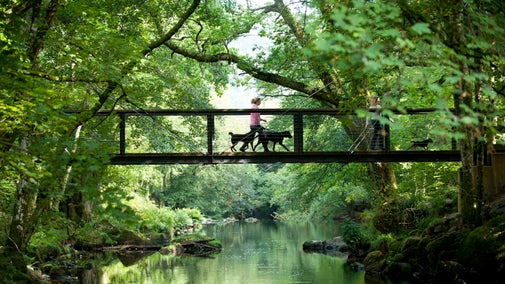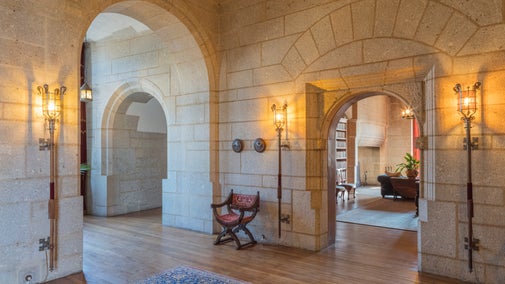
Discover more at Castle Drogo
Find out when Castle Drogo is open, how to get here, the things to see and do and more.

Castle Drogo’s garden is the highest garden cared for by the National Trust. Relax in the sunken rose garden and tranquil chapel garden or wander through the formal terraces and rhododendron garden. Children can play in the Bunty House, explore in the orchard or burn off steam on the circular lawn. Whatever the weather there's something of interest to see in the garden.
The rhododendron garden is closed, but can be viewed from the terrace above. This is due to ongoing plant health control measures. The rest of the garden is open as normal.
For everyone's safety and enjoyment we ask that there are no ball games, or bikes in the garden.
Spring is an exciting time to visit the garden with new life emerging all around, there’s always plenty to see. Our favourite spring locations are the spring boarders that run along the edges of the rose garden. The rhododendron garden, situated below the main garden. The rhododendron garden is at its best in late spring with rhododendrons, magnolias and camellias all in bloom. Throughout the spring the grounds around the formal garden are dotted with wildflowers throughout the season.
If you want to find out more about the garden you can download our garden guide here before you visit.
From Spring through to Autumn, the Herbaceous borders are constantly changing and full of colour. The garden team work hard throughout the year to keep these borders looking at their best, from mulching in early spring and weeding and deadheading throughout the summer. There's always something to do to keep the garden looking spectacular.
The simple space of the Circular Lawn is an oasis of green surrounded by yew trees. At the top of the granite steps there's an enjoyable view straight down the garden.
The gardens are full of colour from early spring until autumn. There's always something to see.
Always popular with families the Bunty House is a treasured and charming additon to the garden. Look out for this tiny playhouse as you explore around the Shrubbery. The Bunty House is modelled on a 1930s suburban home and was built for the youngest of the Drewe children, Frances. The house in the gardens is a replica of the original and visitors young and old are welcome to play in it.

Many of the original trees and shrubs planted by Dillistone are still thriving today. Connecting the circular lawn with the terrace, the shrubbery has trees and shrubs chosen for their rich spring and autumn colour.
Many of the plant specimens in this area originate from China, Japan and Chile. These countries encounter very cold nights and produce plants hardy enough to survive the altitude at Castle Drogo.
Frances Drewe loved roses, so a rose garden was a ‘must-have’ feature. The Dartmoor weather is challenging for rose cultivation, but the milder microclimate of the sunken rose garden gives some protection from the elements.
Each rose bed is labelled with the plant name varieties. During the summer the rose garden is full of perfume, enjoy the different fragrances from one of the garden benches.
The peaceful, secluded Chapel Garden is a compact garden adjoining the castle. Follow the granite steps under the Entrance hall leading you to this tranquil space. The borders comprise of roses, catmint and lavender. A mature fig tree on the wall grows well even in the strong winds and challenging weather.
Situated below the main garden and accessed through the Chapel Garden, this woodland garden has a south-westerly aspect so takes the full force of the winter storms.
Despite being at its best in spring and early summer, the Rhododendron Garden also provides a vibrant display of autumn colour, with acers and birch planted among the rhododendrons.


Find out when Castle Drogo is open, how to get here, the things to see and do and more.

Follow the winding paths below the castle into the sheltered Teign Gorge. Explore this ancient gorge teeming with wildlife on trails along the river or soak up views over Dartmoor.

Discover how a hydro turbine was used at this remote family home and castle on Dartmoor, by generating electricity from renewable resources.

Castle Drogo is a two pawprint rated place. You and your dog are welcome to take a gentle stroll around the grounds or head to the Teign Gorge for miles of dog friendly routes.

Explore the castle’s interior and discover its precious treasures and family stories. As the last castle to be built in England modern features were included for the ambitious owner.

The café at Castle Drogo serves hot and cold drinks, lunches, snacks and sweet treats. Afterwards, stop off at the shop for a choice of gifts and souvenirs to take home with you.

From 18th-century water gardens and Arts and Crafts landscapes to intimate woodland gardens, there are so many places to discover.

Discover our gardeners’ top tips so you can make the most of your garden, plot or window box.

Take a stroll and explore the wide variety of the gardens we look after in Devon.